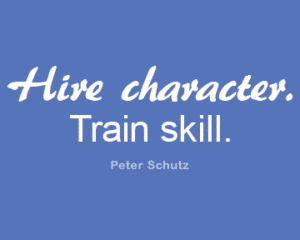Reduce turnover.
Hire productive employees.
Find THE job for you.
Do this all by asking investigative interview questions.

Asking questions based on character and real-life experiences are much more suitable than hypotheticals. There’s no real answer to a hypothetical – but hearing about a candidate’s past performance is a strong indicator of future performance. Asking where you see yourself (or the company) in five years just doesn’t cut it!
As an interviewer, consider these questions to ask in your interviews for real, applicable answers to make a solid hire. As a candidate, be prepared to answer them or ask them yourself to show who you really are and what you are looking for in a position:
Flexibility
- Was there an instance at work when something got put on your plate that you weren’t expecting? How did you handle that situation?
- Have you ever had to handle last-minute changes on a project?
- How do you adapt to working closely with a colleague who has a very different style than you?
- Have you worked on a project that didn’t have full instructions? What did you do?
- Candidate: How can I use my flexibility best in this position?
Time Management
- How do you make sure to manage your time appropriately?
- When was the last time you were late for something?
- Discuss a situation in which you ran out of time finishing a project. How did you make it work?
- Candidate: What would be my main priorities in this position to best help my department and the company?
Communication
- How have you dealt with re-communicating something you’ve thought you made clear?
- If there is an issue with quality, how do you communicate that with your manager?
- Talk about a time when you had something difficult to tell someone about their project. How did you present the information?
- Have you had a problem with a client due to communication? What did you learn from the situation?
- Have you needed to communicate something important to someone who may not have liked you? How did you get your point across?
- Candidate: How would you describe the overall communication style of the company?
Initiative
- Name a time when you turned a negative into a positive opportunity. How did you accomplish it?
- Have you ever created any processes/procedures that were implemented company-wide?
- What do you view as your greatest professional achievement to date?
- Candidate: In what ways have employees made positive changes here? How were they communicated and implemented?
- Candidate: I have been successful in my past with bringing unique ideas to the table for the betterment of my employer (list 2-3 stories of your initiative). How is this company looking to grow or improve, and is this something I can contribute to?
We can help you prepare for an interview on either side. Reach out to one of our ROLINC Staffing division managers to navigate your interview on facts, not fluff. We aim to hit the mark – let us help you find talent or get hired today!
